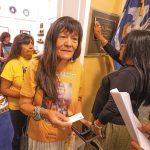
Letters: Looking for our ‘hero’ in the political process
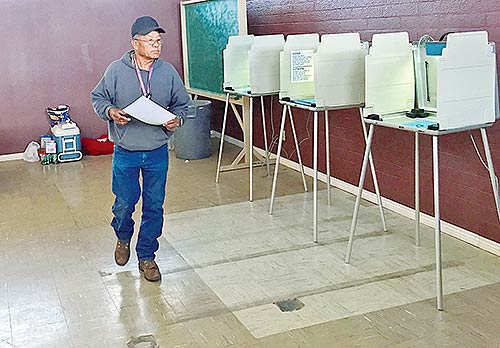
A voter on Tuesday evening walks toward the ballot box after casting his vote at Ts’ah Bii Kin, Ariz. According to unofficial results, Begaye-Nez received 185 votes here while Shirley-Benally received 53. (Times photo – Krista Allen)
Here we are with our tribal presidential election. Once more we’re searching for a “hero” expecting to save us from ourselves. Some may have searched webs of information for validity but what’s not revealed is the stuff of dreams from worthy candidates, as in potential, promises, surprises, achievements, and possibilities for our society.
Basically, every election we choose our “hero” from our perceptible self — the mirror-image candidate. We seek our long-lost twin in the mirror of self-image. It’s the candidate who seems similar to us in thought and behavior.
At times the exploits of “comparability,” to seek similarity, and “compatibility,” to co-exist in harmony, become contradictory and parasitic, thus trouble emerges. Instead of blaming our servant “hero” perhaps we should approach our dilemma with “complementary competency,” a process that’s reciprocal and supportive between voters and candidates. If not, what’s a “hero” for anyway?
Because of the presidential forum’s limited-time response of inquiries from our candidates, the wanna-be “heroes” experienced frustrations and disappointments. These forums are proving grounds. However, without detailed information as “to the lay of the land,” from candidates the task of choice becomes intricate for the voting public.
This time-frame setback is understandable during this preliminary political election process. It’s an excellent exercise in exposing the candidates’ validity on intention for public service. And with climbing costs, the do-more-with-less mentality, and budget cutbacks, the uncertainty of expenses for the candidates’ agenda-platform have echoed, “Show-me-the-money!”
The presidential forums aren’t child’s play where you fly by the seat of your pants, or desperately dodge or attempt to operate from crisis-to-crisis when confronted with complexities. Such role prohibits surrender of rights and privileges to disturbed bullies or overlords from other territories. Yes, as in real-life situations, “Time waits for nobody!”
This time factor further demonstrates and showcases the presidential candidates’ immediate innate preparedness, comprehension, reasoning, knowledge, and decision-making aptitude during an inquiry. It’s an essential art for such a political undertaking, “Thinking on your feet at a moment’s notice during an alleged crisis.”
As in countless “hero-worship” stories, retold in fictional films, history, cultural myths-legends, in everyday life across our communities, and even in dreams, as archetypes their courage to endure is achieved through encouragement. All have gone beyond their call of duty without expectation of failure. They overcame challenges and obstacles throughout their journey. A self-sacrifice for the greater good.
These “heroes” definitely had help along the way. When victorious, there was a shift into a new paradigm. They returned from the abyss, stronger, more compassionate, with a sense of duty, and have returned with a miraculous gift for society. Their journey of being the one for the many was difficult, but the strong-willed “hero” achieved a fundamental change from within and expanded outward, prosperity followed.
Obviously, as a people, (we are in) our constant struggle for our very existence. Is it too late for redemption when those helpers along the shoreline are imparting instruction to us on how to swim, as the boat we’re in is about to go over the waterfall? How ludicrous of us to be seduced by old rhetoric from old fading energies, when there’s new energy in places we don’t even know exist. The mechanism of cause-and-effect works every time, triggered by process of connecting relationships and, as always, valid solutions are within the problems.
This election could be something magical and heroic if there’s profound realization that we, the people, can resolve our problems with our innate nature. How soon we forget, we’re once in synchronicity as Mother Earth-connected beings. Look into the mirror, your “hero” stands before you and when does the journey begin?
Robert L. Hosteen
Beclabito, N.M.
Take care when editing letters
This letter is written in hopes that the Navajo Times will objectively take in constructive issues and concerns. It is good that members of the public readership write to the Times to share their thoughts on matters they see as important to our people’s well-being. While voices of the public are very important, the Times has the critical responsibility of having to filter out opinions that cross the border on civility being ever mindful, especially of today’s uncivil state of national affairs.
The Navajo Times understandably is caught in this hazy nebulous area of having to determine what viewpoints may be of public interest as well as meeting quality journalistic standards. In the course of events here, however, in a cross-cultural setting, editing voices from the public can become akin to dropping a mutton rib roast into cedar fire ash and then attempting to remove the ash – one washes off the ash along with the rib roast flavor.
While the Times editors should be commended for the thankless job of having to remove the ash from the rib roast, maintaining the flavor poses serious challenges. The point here is that the need for editing should not have to translate to fragmented incomplete thoughts where the public viewpoint is no longer a public viewpoint.
Editing within a cross-cultural setting can very easily turn to withholding important insights, thoughts from the public where authentic viewpoints, in some cases meaningful provocative thoughts, become pointless, meaningless, rhetorical. Thoughts that are edited out, withheld from the public then become inert, lie useless in a desktop where potentially these insights may have contributed to public good.
Limiting views takes away from a once great flourishing culture now in urgent need of lasting solutions to dire socio-demographic challenges and issues. It’s difficult enough as is that communication in a cross-cultural setting invites great risk in misunderstanding, confusion, misinterpretation, a communicative fuzziness that some have referred to as ontological and epistemological blurriness in the academic community.
As Native newspapers have a powerful sway on local, tribal, state, national, and international affairs, it is important that, in our cross-cultural setting viewpoints continue to reflect fully genuine engagement from the public and not so much view public Native comments as thoughts beneath serious status quo journalistic standards.
In print media, specifically Native papers, much can be lost in cross-cultural editing where editing may very well constitute a breach and compromise on sovereign indigenous insight let alone an undue infringement on unaltered epistemic Native framework and thought. If left unchecked, cross-cultural communication in the mass media or otherwise can amount to “…seeing the world less ‘as it is’ and more ‘as we are.’ ”
The Navajo Times should support and encourage a platform where authentic Native voices are heard that may possibly lend to improving our peoples’ ground level life circumstances. Perspectives of depth and breadth, the “exponential powers of multiple perspectives,” are important to abating serious socio-demographic issues and challenges in our communities.
Transparency, honesty, trustworthiness, integrity, and the like, are paramount to these critical issues and Native papers are often the last resort for complete investigative reporting as well as leadership accountability that are of major public interest. The lack thereof has serious ramifications not only for our entrenched concentrated economic injustice, the spiraling natural resources desecration and environmental degradation, land, water rights and usage, but also for everyday immediate issues such as the absence of payroll check coming through the door that hits at the core of basic livelihood and well-being of families, especially as these may impact those who are most vulnerable — the elderly, our youth and the future of our children and grandchildren.
In the interest of rising to prominence economically, crafting policies for a healthy optimal robust economy for our people, it would help if Native publications would reflect unaltered epistemic Native framework and thought as seen through the lens of Native peoples.
Harold G. Begay
To’Nanees’ Dizi, Ariz.
Stay out of the rough
On Saturday, July 21, a friend visiting from Michigan and I were driving to Second Mesa when we came upon the sign announcing “Rez Golf” a few miles past Burnside junction. Intrigued, we two non-Navajos decided to drive in to survey the situation.
To our delight, we were welcomed with open arms. We were shown the clubhouse, given a synopsis of the event, and treated as family. The ladies we met were so incredibly proud of what they had achieved in the dry desert of Steamboat and rightly so. And they spoke to future plans as they toured us. We were surprised to learn this marvelous and fulfilled seeming event was nine years along.
This kind of entrepreneurial spirit is one that should be commended and applauded. I say, “Congratulations.” To the golfers, I say, “Try to stay out of that unforgiving rough.”
Dennis Hayes
Sawmill, Ariz.
Memories, tears, hugs
Memories of the day we first are welcomed into the world. As we age, it’s the memories that are remembered and talked about — school, primary, middle, high, and colleges — but unending, then starting our own families and meeting new employees. The laughter – mom, dad, this is your grandchild, the girlfriend, my wife, the first kiss.
Sports coverage by employees of KTNN-AM 660, Navajo Times, and Gallup Independent, your fans and relatives are cheering you. As I can’t believe, two relatives passing a day or two apart, residents of Ganado Lake and Greasewood Springs, and where their spouses led them near the in-laws. It’s a shock to the communities, friends, co-workers, parents, brothers, sisters, one’s children, and the spouse. It’s endless. What do you say? So many unanswered questions.
LA Williams, Oree Foster, Santiago Ramos, Alan Arthur, Donovan Quintero, Quentin Jodie (sportswriters and staff), thank you for the coverage of Lavon Salabye Jr., Ganado Hornet all-around in basketball, football, and track and field. There is so much but endless memories, endless tears, and endless hugs. Thank you, son, for all the memories from all of us Hornet fans and relatives.
Steven Kee
Ganado, Ariz.
Thank you for Intermountain notices, story
Thank you, Navajo Times, for putting up with us for printing the announcements about our meetings every month and putting on the front page about our 29th Annual Family Reunion in Wheatfields, Arizona.
As the committee president, I would like to say thank you to all graduates of Intermountain School families and relatives for their support at our reunion.
Special thanks to Cindy and Amber for printing the article and announcements in the paper for us.
Robert Dodson
Fort Defiance, Ariz.
First hall of fame was at Haskell
This is in response to the article by Rachel Banks in the Navajo Times edition of July 26, 2018 (“Lori Piestewa, 11 others to be inducted into first Native American Hall of Fame”).
For your information, the first American Indian Athletic Hall of Fame was organized in the 70s at Haskell Indian School in Lawrence, Kansas. Athletes throughout the country were nominated and enshrined into the Hall of Fame Museum at Haskell Indian School.
Wallace Hanley
Window Rock, Ariz.

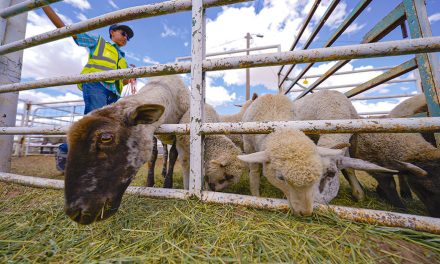
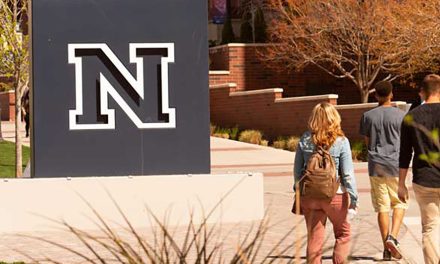

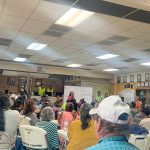



 Highway 264,
Highway 264, I-40, WB @ Winslow
I-40, WB @ Winslow